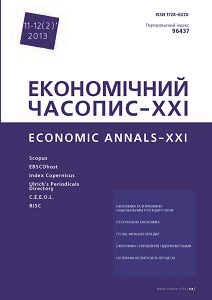ІДЕОЛОГІЧНА СЕГМЕНТАЦІЯ НІМЕЦЬКОГО ЕЛЕКТОРАТУ НА ВИБОРАХ БУНДЕСТАГУ (1990–2009 рр.)
IDEOLOGICAL SEGMENTATION OF THE GERMAN BUNDESTAG ELECTION VOTERS IN 1990-2009
Author(s): Iryna Petrivna MelnykSubject(s): Politics
Published by: Institute of Society Transformation
Keywords: ideological segmentation; voters; election; members of parliament; electoral cycle
Summary/Abstract: Free and fair elections of authorities are an important element of democratic stability in any country and the key to solving important social problems. It is through the mechanism of elections governing authorities are updated to address actual challenges. That is why the work on the analysis of the ideological preferences of voters in democratically developed country like the Federal Republic of Germany, is relevant. The aim of the article is to study the ideological segmentation of German voters’ participation in the electoral cycle period of Anschluss. Analysis of ideological identification of German electorate in elections to the Bundestag in 1990, 1994, 1998, 2002, 2005, 2009 is undertaken on the base of performed electoral participation. Attention is focused on the type of electoral system (mixed majority- proportional system) according to the rules of elections to the legislature of the Federal Republic of Germany. Classification of contestants on the centre-left and centre-right supporters of political entities has been made. The features of the each electoral cycle course, changes in the structure of power elite, and clarification the specific political, economic and social conditions within campaigns have been revealed. Ideological segmentation of the German electorate as a result of performed electoral support is characterized by constant struggle between parties or blocs of political parties with centre-left and centre-right ideologies. So, the first in 1990 and the last in 2009 electoral cycles showed narrowing of centre-right parties support, the election results in 1994 showed the same level of voters support for their parties, and electoral cycles 1998, 2002, 2005 gave evidence of the centre-left political entities popularity among the Germans.
Journal: Економічний часопис - ХХІ
- Issue Year: 2013
- Issue No: 11-12(2)
- Page Range: 71-74
- Page Count: 4
- Language: Ukrainian

